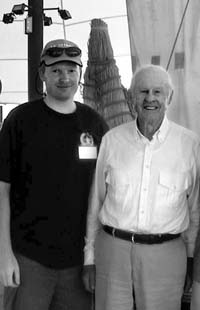Motive Power of Dreams

Every century witnesses celebrated travelers merited with making great discoveries enriching world history. Norwegian seafarer Thor Heyerdahl became a living legend of the twentieth century after his 1947 voyage aboard the Kon-Tiki balsa log raft.
Last year the 87-year old scientist underwent surgery for a cancerous tumor, but the latter appeared to have spread to the brain and the doctors found it inoperable. World news agencies reported recently that last week the intrepid mariner passed away.
To many Thor Heyerdahl is a symbol of freedom. The Day asked its experts what they saw in him.
Teodor REZVOI, the first CIS solo rower to cross the Atlantic in a boat:
This person must be a legend to many people. His travels added strength and enhanced desires, they allowed one to dream of doing something like he did. His example is a dream motive power.
Valentyn SYMONENKO, chairman of the Accounting Chamber of Ukraine:
To me, Thor Heyerdahl was a Man in the upper case. Frankly, I learned to live from many of his books. The first one I read was Kon- Tiki (carried by the Yunost Magazine as “Voyage Aboard the Kon-Tiki”). He was certainly a personality that makes one think, who believed in good and well-wishing people of the world, and who helped me, as a mountain climber, form an ideology saying that man is created to learn to surmount outwardly insurmountable obstacles and act beyond what is believed the limit of human capacities.
Dmytro KYSELIOV, journalist:
He was the man that put together an international crew and crossed the ocean on board the Kon-Tiki in 1947. The event was more important than the Yalta and Potsdam conferences. It was a look to the future, not a retribution of the past. Thor Heyerdahl tried to build his model of the world, he was the twentieth century Noah. I read his Kon-Tiki as a boy. I was in a hospital and the book was a source of inspiration, a symbol of the open world. Thor Heyerdahl is the antipode of Erich Maria Remarque, who wrote about the lost generation. Heyerdahl counterpoised him with the new opportunities of the free world. He demonstrated that freedom is an inner, not outer category. In many respects the legendary seafarer formed the Norwegian nation, instilling in it a system of values that would help Norway, a provincial European country, become an advanced economic nation and a European spiritual leader, a leader for all those wishing to live differently.
Kostiantyn RYLNYK, traveler, Equites team:
Needless to say, we all have known and loved his books since childhood. Thor Heyerdahl became a living symbol of travel, and I have always dreamed of traveling. He was a man of colossal daring. I wish I could do something like he did, come up with a hypothesis and prove it with my whole life.
Valentyna PALIYENKO, Ph.D. (Geography), deputy director, National Academy’s institute of geography:
Thor Heyerdahl is a legend, a Traveler in the upper case. He was a living encyclopedia, a unique personality eager to enrich his and public knowledge. I am aggrieved to have learned of his mortal illness. Our science and society have sustained a very heavy loss.
Ihor MOLIAR, author and host of the “Autopark” television program:
To say that Thor Heyerdahl is a living legend means saying very little. There are very few others like him, and their number decreases with each passing year. It is sad. Just a year back we all watched and heard Yuri Senkevich [veteran host of an extremely popular Soviet television travel program surviving perestroika and glasnost, and even the fall of the USSR]. He was a good friend of Heyerdahl’s. He told a lot of interesting stories about him, describing him as a charismatic individual. I think a real traveler should act that way. One can travel across the world time and again, but it takes a lot more courage to make a trip within one’s inner world, exploring one’s own innermost capacities. By refusing treatment Thor Heyerdahl did just that, passing to a new level, getting ready to set off on his last voyage.






